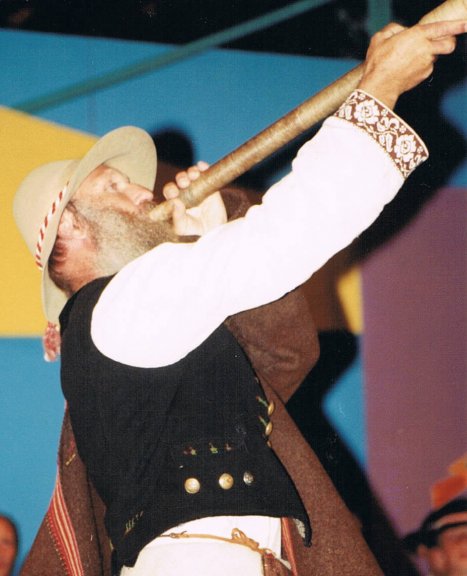Broda Józef

from Koniaków, born in 1941
Folklorist, a brilliant multi-instrumentalist and builder of folk instruments, a charismatic educator, animator and activist of culture, a social worker sensitive on human misfortune. He was born on December 9, 1941 to Ustroń-Lipowiec. He studied at the Higher Pedagogical School in Gdańsk and other academic centers (in Warsaw, Toruń, and Lublin). For many years (1963–1995) he worked as a teacher and teacher in primary schools in Istebna and Koniaków, popularizing local traditions among children and young people. Folklore has become a means of education through acting in creative groups, for example in the form of a ceremonial theater. Presented, among others in television programs, performances popularized folklore of the Silesian Beskids throughout Poland, and for many teachers became an inspiration in pedagogical work. These activities continued until today, called by Józef Broda a natural theater, are an example of the symbiosis of man, nature and culture. The specific perception of a man's place in nature, of which he is a part, has also become an inspiration for the realization of extraordinary outdoor performances. Józef Broda took part in them not only as an instrumentalist, he was often their creator and director.
He learned music from the greatest masters of his region e.g. Jan Kawulok. He plays on every highlander instrument (trembits, "gajdy" – kind of bagpipe, ocarina, pipes, "sałaska" pipe, violin), as well as on a sheet or stalks. He sings wonderfully – with a white voice. Thanks to field research, he has a rich repertoire of songs and chants. Initially, he took part in folk music competitions: he is the laureate of the festivals in Bukowina Tatrzańska (1971), Kazimierz on Vistula River (1973) and Budapest (1974). For many years, he collaborated with well-known composers: Ryszard Gabryś, Józef Skrzek and Janusz Kohut. He was the performer of their compositions and co-organizer of musical and folklore performances. He performed both individually and with children or youth groups at festivals and folklore reviews – in Bukowina Tatrzańska, Zakopane, Żywiec, Kazimierz on Vistula River, Płock, Czechoslovakia, Russia, Switzerland, Austria, France and Hungary. His recordings are in tapes of radio and television stations in Warszawa, Kraków, Katowice, Wrocław, Budapest and Cologne. In 1997 he recorded a CD entitled "Symphony about passing away, life, death...", a musical story about one day in the lives of mountain people. The material was registered under natural conditions – in the artist's open air and at Wyrszczek in Koniaków.
The cooperation of Józef Broda with old musicians and multiple attempts meant that he also mastered the art of building instruments, specializing in the performance of simple pastoral instruments. I think that by building, looking for, we find ourselves because we are God's instrument. We as a person, as a separate. Not as water, although we have a lot of it. Not as a tree, though we should be rooted in cultural scopes. We are not a bird, but we have our imagination. But we are certainly a separate entity, a different person from everything that surrounds us. Isn't it beautiful? Beauty is to free human good, forgiveness, love and joy from human existence. All this can resonate in the world around us, which God created to admire him, just like a child does, says the artist.
Over the years, he has led prestigious events: International Folklore Meetings (as part of the Beskidy Highlanders' Week of Culture), National Polish Review of Folk Bands and Singers in Kazimierz, Children's Day of the Mountains in Nowy Sącz. He played in the play, he co-created a radio program for children, he wrote columns. He also participated in educational programs run by the Regionalny Ośrodek Kultury in Bielsko-Biała and he organized creative workshops, teaching children how to build simple folk instruments from natural materials: wood, clay, straw, elderberry, reeds, feathers.
Józef Broda is among others the laureate of the Red Rose Award (1979) and the Józef Chałasiński for popularizing culture (1984). In 1995 he was awarded the Oskar Kolberg Award. He also has the Karola Miarki Prize (2006), Silver Medal of Merit for Culture, Gloria Artis (2008), Silver Cieszynanka – Cieszyn Land Laurel (2012). In 2014 he was awarded the Knight's Cross of the Order of Polonia Restituta, and in 2016 he received the annual award of the Minister of Culture and National Heritage.

